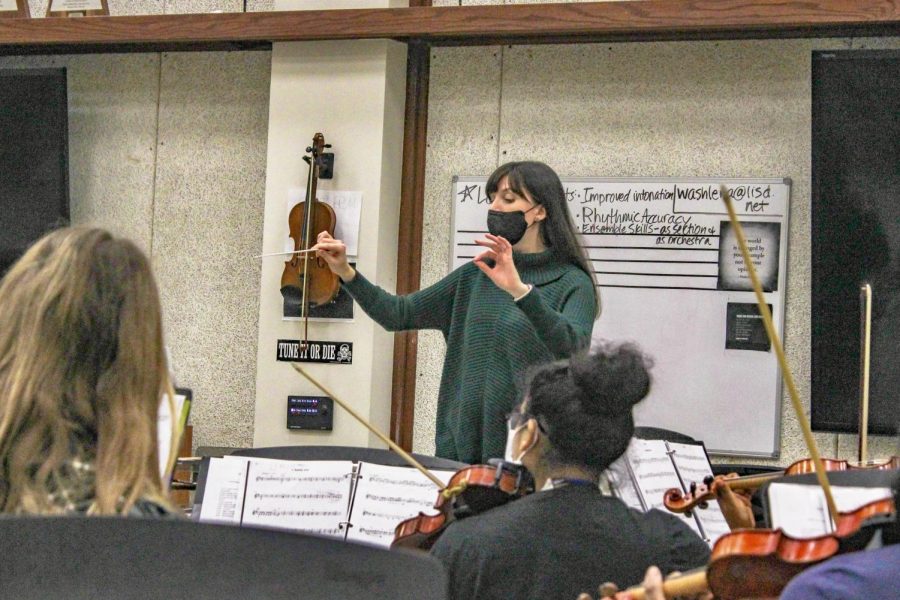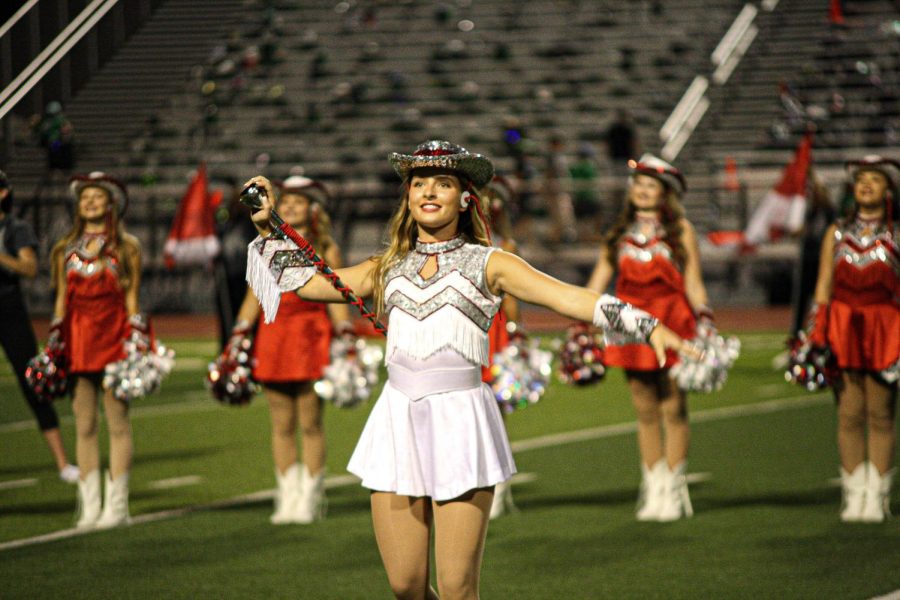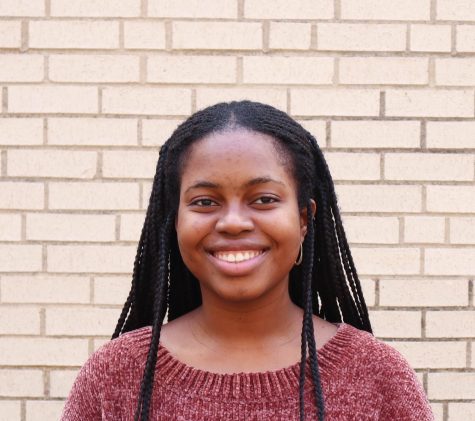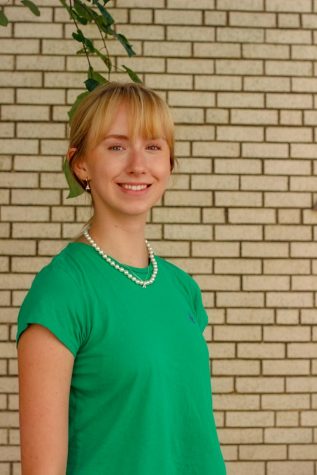A quick look around the orchestra room affirms Orchestra Director Allison Washler’s love for mantras. A tarp with an Aristotle quote sits above her podium:
“We are what we repeatedly do. Excellence, then, is a habit, not an act.”
There’s one from Yoda, above the cello section:
“Do or do not. There is no try.”
But by late January, Washler had a new motto.
She used it when conducting the few COVID-free, non-quarantining students who were able to make it to rehearsal. When she was forced to face their unwavering deadline and admit that she didn’t feel prepared.
“It is what it is.”
***
Washler loves her job, especially being around her students. She loves choosing concert programs that highlight their strengths and force them to grow.
“If you think about how much we improve over the course of the year, and then over the course of four years — if I’m lucky enough to have people for all four years — it’s amazing,” Washler said.
Last December, Washler started preparing the program for February’s UIL competition.
In the six years that Washler has been director, the Chamber, Sinfonia and Philharmonic orchestras have always earned sweepstakes: an average of 1’s, the highest score possible.
“We have committed students,” Washler said. “And even if [they] don’t feel stress over UIL, I think [they] just want to be excellent in what [they] do.”
Washler knew that COVID-19 would make it harder to maintain their perfect record. But when she picked out pieces, she didn’t want to lower the bar for her students — or herself. She and Assistant Director Samuel Park chose music they knew would challenge the students.
“No matter what is going on, inside of our classroom or outside of it, we continue to hold our students to that standard,” Park said.
By mid-January, COVID-19 spread throughout the orchestra. Hordes of students would miss ten days of rehearsal and then discover that the rest of the class was already refining parts they couldn’t play yet. Periods were often spent playing catch-up.
“That’s a lot of stress on those students who are there,” Washler said.
According to Washler, the absences hit the Chamber orchestra the most. It was already the smallest orchestra, but some days, as few as four people per section were present.
“There was probably two weeks where at least a third of Chamber was out,” Washler said. “And so that was really challenging because there would be one first violin some days, or two second violins.”
The directors tried to use extra methods such as extra rehearsals to catch students up. But there were parts of the program that the students just weren’t picking up.
Washler knew that it wasn’t the students’ fault — they were working hard during a challenging season.
“I think the fact that [this year] has had some even greater challenges than last year has been a little bit of a surprise,” Washler said. “But overall, I think the students have proven to be really resilient, and the energy is still there.”
Just as the absences were affecting her students, they were affecting teachers. She saw her colleagues show quiet strength by coming to each other’s aid, whether it was through teaching each others’ classes or being there to provide compassion and support.
“All the teachers I know go the extra mile and help where they can, and don’t complain or anything,” Washler said.
Teachers were stressed. She was stressed. But she tried to keep it from spilling over to her students.
“I think the biggest thing I want from my students is just for them to give their best,” Washler said.
When teacher absences forced the school to shut down from Jan. 26 to Jan. 31, the orchestra lost two days of rehearsals — with UIL in less than a month.
Washler went home to her family on Wednesday, ready to accommodate the missed two days in the rehearsal schedule. Ready to go back to school and lead her students the following Monday.
But over the break, her baby boy tested positive for COVID-19.
***
When asked what her favorite part of the day is, Washler doesn’t hesitate — it’s coming home from work, to hear squeals of, “Mommy” from her two baby sons.
“My goal, being a mother, is … that you always want your child to feel loved every single day and like they’re wanted,” Washler said.
She and her husband balance taking care of their children with their teaching careers. Some Saturdays, Washler has to spend the whole day apart from her babies because she’s judging competitions.
“There are a lot of days when I won’t see them, and like I’ll look at them on the monitor when I get home,” Washler said. “And I wish I could cuddle them, but they’ll already be in bed when I get home.”
But when her son became sick, Washler knew that she had to take time off to be with him.
“I was very conflicted, because obviously I wanted to be with you guys,” Washler said. “But that’s one of those spots where family has to come first.”
However, these were two days that she couldn’t prepare her students. While Washler made plans for a substitute, she realized that as much as she pushed, the Sinfonia orchestra might not be able to prepare their hardest piece in time.
Just in case, she printed out an easier piece.
“I was ready to switch them out,” Washler said. “Not that I was going to be mad, but it just wasn’t going to work out.”
***
Sinfonia cellist Caroline Aragao was setting up her instrument when she heard the substitute teacher call her and junior Lance Clark’s names.
The substitute was reading off a list of instructions from Washler: Caroline and Lance were supposed to teach the class.
Caroline, who is the section leader of the Sinfonia cellos, loved being trusted to take on another leadership role.
“It gives me a sense of, ‘Wow, Mrs. Washler thinks that I’m able to do this?’” Caroline said. “‘That’s really cool. I can’t let her down.’”
She and Lance weaved through the sections as Washler usually would, tuning their classmates’ instruments. When it was time to play through the pieces, Caroline conducted the class with nothing but her cello part.
“Having to lead all of the sections with nothing but my music, not even the score, it was a little stressful,” Caroline said.
When Washler came back on Wednesday, she asked them to play through their pieces, to see how far they had come.
By the end of their performance, she was fighting back tears. They sounded much better than they had before the break.
“I was so proud…” Washler said. “And just happy that you proved how awesome you are.”
She put the replacement piece away. She knew they would be okay.
***
Feb. 7 was the day the orchestras came back after the school shut down for the storm. It was also the day of Pre-UIL.
While the stakes were lower, it was still a big event. Instead of stressing about how much time had been missed, Park worked at his students’ level — something he’s learned in his four years as a teacher.
“We come in after the break, get started, hear how things are going, and just pick up right where we left off,” Park said.
The judges left positive comments on every performance. As Omicron started to subside, the chairs in the room began to fill back up.
The orchestras are still working to meet their goals, but Washler is choosing to focus on what matters most: her students’ growth. Behind her sharp conducting and efficient rehearsals is a steady calmness.
“I realized a few years ago, like it’s not worth getting so anxious myself,” Washler said. “It’s not good for my health. It’s not good for my students’ health.”
Park also directs three classes at Lamar Middle School. He drives to Marcus to conduct the Philharmonic orchestra during fourth period, making him responsible for four orchestras.
He manages his stress by drawing a line between work and his personal life.
“As soon as I leave the school, that’s my time,” Park said. “So I get to do the things that I want to do.”
He said another method that has helped is collaborating with other orchestra directors. He and some other district middle school directors have formed a group chat where they share their struggles and ask for advice.
“A lot of times, we’ll just vent about, ‘Oh, my group is really struggling with this piece right now,’” Park said. “‘You know, I’m not sure how we’re going to fix this.’ And then usually, that ends up turning into a positive, because other people will share, ‘Oh hey, I played that piece before. Have you tried this?’”
Washler believes that considering the setbacks of the past year, teachers should be less hard on themselves about things that they can’t control.
“It really is what you make it,” Washler said. “But also, at a certain point, it is what it is. The days off, we couldn’t do anything about that. It is what it is. And so I’ve just learned, since having kids, you have to choose your areas that you’re going to let yourself get stressed about.”
Even though it can be difficult, Washler believes in the power of going to peers for guidance and comfort.
“That’s for all of us,” Washler said. “Don’t be afraid to ask for help.”










